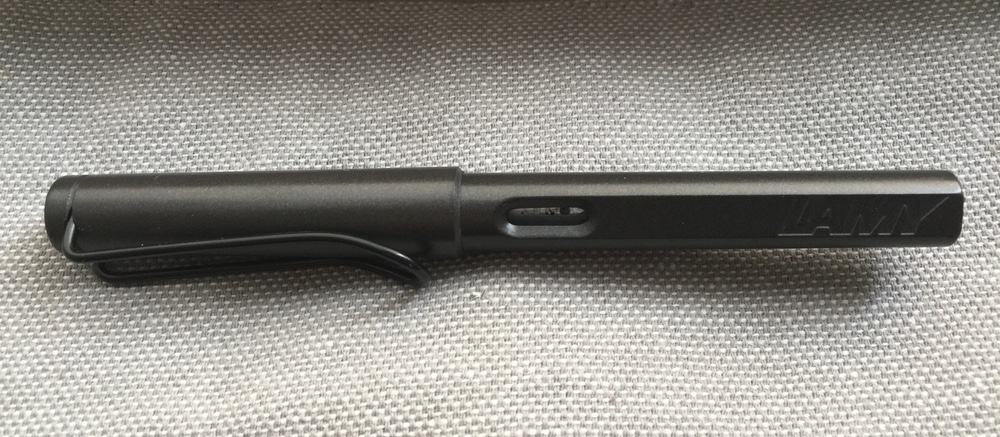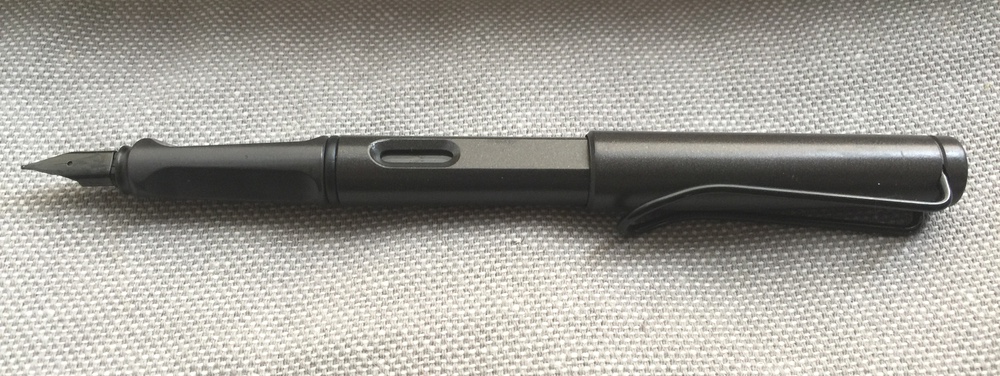"Write each vocabulary word three times". The instructions were simple, but these six words were responsible for hours of unspeakable horror. Of course, all of the words were to be written in cursive, in pencil, and on the cheapest newspaper print that a public school could afford. I hated cursive.
I hated cursive because I had terrible handwriting. My loops were overly large and my letters were inconsistent in every sense of the word. I started using print as soon as my teachers allowed, and my shameful signature is all that remains from the days of scribbling vocabulary words over and over.
This is the best signature that I can muster.
My terrible handwriting has always been a sore spot, but I've been able to avoid it, largely due to the digital world in which we live. I've taken all of my work notes in Evernote for the first three years of my job and hardly ever put pen the paper. Even when I wrote for the, now defunct, AppStorm blog network, all of my work lived and died in the digital world.
I discovered The Pen Addict podcast a little over a year ago, during the launch of Relay.FM, a podcast network. I love tech podcasts and was browsing the catalog for new shows when I discovered a podcast solely devoted to pens and stationary. Who in their right mind would create or, even worse, listen to an audio podcast about pens and paper? Nearly 170 episodes later I've listen to every single episode at least twice. Although I owned zero fountain pens and mostly took notes via an iPad, I was enamored with the passion with which Brad Dowdy and Myke Hurley talked about their geeky hobby (perhaps lifestyle is a better word). As a teacher I've grown to appreciate the willingness to explore and the unapologetic obsession that comes along with discovering something that you love, and Myke and Brad are certainly in love with pens and paper. I began to think that there was something to this analog lifestyle.
There are many excellent blogs devoted to pens and stationary, many of which have at least one article touting the benefits of handwritten note taking. The more I looked into it, the more it seemed to boil down to the fact that handwritten note taking is a much more complex task for the brain. It forces the writer to analyze and summarize content, instead of just regurgitating it out through the fingers and into a keyboard.
Aside from the memory benefits, many blogs also mention that fountain pens can help with poor handwriting. Before you cringe at that last statement, I should underline the use of "can help with" not "will eliminate". It takes time to adjust to a fountain pen, especially when coming from a world of Bic sticks. This can result in slower, more intentional writing, instead of scribbling as fast as the words come to mind. Fountain pens also seem to require less pressure, and writing with a light touch produces a more fluid outcome.
The case was made and I was convinced that I should start taking handwritten notes. Rewarding myself with cool new toys always helps with forming habits, so I decided to purchase a fountain pen. It's not as easy as it sounds, considering the thousands of options available. My requirements were simple, and this helped to narrow the choices. I wanted something that was less than $30, easy to maintain, and on the skinny side. I turned to my beloved Pen Addict podcast to help me make the choice. The Pilot Metropolitan and Lamy Safari rose to the top as I listened to the podcast and browsed other pen blogs. I fell in love with the Safari's unique look, compared to the more traditional Metropolitan. I found this page and the list Top 5 Fountain Pens Under $50 and finally decided on a Safari. If little German school children could handle this pen, then so could I. I ordered a black fine-nib version. This was going to be my workhorse pen, so I didn't want something that was too flashy.
My bundle of joy arrived in a little slim box, and I was off to the races, or so I thought. I snapped in the ink cartridge and was prepared to begin writing my manifesto.
Nothing…
I waited a minute, scribbled, and still nothing. I turned to the internet for help. Tapping the pen didn't work, nor did letting it sit for an hour. I finally stumbled upon a video that showed how to squeeze a cartridge to get things flowing.
Victory!
Notice the ink slick where the nib meets the barrel?
I scribbled around for a bit, capped the pen, then put it in my work bag. I was actually excited to go to work! The first meeting of the day brought major disappointment. I posted my pen and began writing. I noticed huge ink smudges on my fingers from ink that had welled up on the plastic at the base of the nib. Maybe I overfilled it?
I continued using the pen regularly for a week, making sure to keep my fingers up on the grip and away from the inky mess that waited below. The pen was out of ink by the end of the week, with less than a few hours worth of writing time. Something wasn't right. My new hobby was quickly converting into a giant messy bummer.
Notice the green discoloration from the T&T review? I noticed similar discoloration on my pen from dried ink.
I refilled my pen after my bottle of Noodler's ink arrived but it continued to leak around the base of the nib. Perhaps this is what all fountain pens do? Maybe this is normal? Shawn Blanc's site Tools and Toys posted an excellent writeup about fountain pens, including my beloved Lamy Safari. I noticed that the reviewer had the same barrel discoloration but didn't mention leaking in his review. Apparently this was normal, or so I thought. I removed the Safari from my bag and put it on the shelf. So much for my new hobby. Fountain pens were just too messy.
Would this be the end of my fountain pen journey? The answer was somewhere on the other side of the world.





